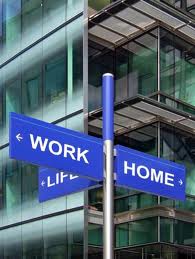Bosses can create culture of work-life balance and flexibility, say experts
By Joyce Teo, The Straits Times, 14 Nov 2011
IF YOU are a stressed-out and overworked employee, you have company.
Last week, a global survey conducted by serviced office operator Regus confirmed what many in Singapore already knew - that many here tend to work long hours and take work home.
It says that half of the workers in Singapore spend well over eight hours a day in the office and 50 per cent regularly take work home to finish in the evening.
About 19 per cent of workers here surveyed work more than 11 hours a day, nearly double the 10 per cent globally.
The figure is just 5 per cent in China, where most people work seven to nine hours a day, and 8 per cent in Australia.
Mr William Willems, regional vice-president of Regus Asia-Pacific, says the results very much reflect his own experiences in Australia, where a large proportion of firms support flexible working hours, and Singapore.
'In Sydney, for example, the general working culture is very much more focused on clocking out on time, while in Singapore, workers are a bit more willing to blur the lines and work later in the day to get their jobs done.'
Why do we work long hours?
MR MARTIN Cerullo, managing director for development for Alexander Mann Solutions in the Asia-Pacific, noted that Singaporeans, who come from a tradition of striving hard for the betterment of future generations, naturally display dedication to their work.
'As Asians, Singaporean workers and professionals see several traits such as frugality and hard work as means to achieving success,' he says.
'Moreover, work patterns are changing as the inter-connectivity of the world en-ables and sometimes requires responses to be made instantaneously, which translates into employees working beyond office hours.'
This brings to mind a recent study from Employer Alliance, a network of corporations that aims to raise awareness of the benefits of work-life strategies.
'If paid work continues to function within a rigid paradigm which takes dominance over family life, in the short term, employees will simply adapt,' it says.
Normalised work pattern
'BECAUSE we live in a very densely population city-state, we are more likely to share aspirations and expectations,' says Dr Paulin Straughan, a sociologist and vice-dean of the National University of Singapore arts and social sciences faculty.
'So, if we see our neighbours and colleagues clocking long hours, over time, this work pattern will be normalised. We will begin to expect that working 10-hour days is normal.'
She adds: 'With the current performance appraisal system which rewards output, and with the introduction of the performance bonus which rewards the 'top performers' annually, employees are inevitably drawn into a competition where they know that the one who runs the fastest and the longest will win the race.'
A heavy price to pay
DR STRAUGHAN says we do this because we want to do well and to be affirmed for our commitment. But it is not healthy in the long run.
'If we continue to allow this overwork culture to dominate, the consequences are disastrous - delayed marriage, sustained low total fertility rate, an increase in the proportion who remain single, and a fast ageing population.'
Indeed, if 'family formation becomes an anomaly rather than a priority, the labour force in Singapore will age and we will no longer be a competitive or vibrant place to do business', notes the Employer Alliance study released earlier this month.
Is there a way out?
APPARENTLY so. Experts say the answer lies with flexibility in the workplace.
Mr Willems says employers should 'manage workers by results, not by line-of-sight', so people do not stay late in the office for appearances' sake.
Management can lead by example and create a culture of work-life balance in the workplace, says Mr Cerullo.
The second way, says Mr Willems, is to give workers some level of flexibility in where and when they work.
'Singapore has the technology and infrastructure to be able to do this, be it working from home, the office or a third place like a cafe or a business lounge,' he says.
'It's also important to give workers fair targets and empower them to exceed these while being able to maintain their job performance. This comes from encouraging your staff to maintain a good work-life balance,' he adds.
What it all boils down to is that employers need to change their mindset, as traditional work expectations where overtime work indicates commitment no longer apply today.
'The way we engage labour now is not sustainable,' stressed Dr Straughan.
'We must adopt a new perspective on how we view labour - as investment in human capital and not as mere operation cost.'

No comments:
Post a Comment